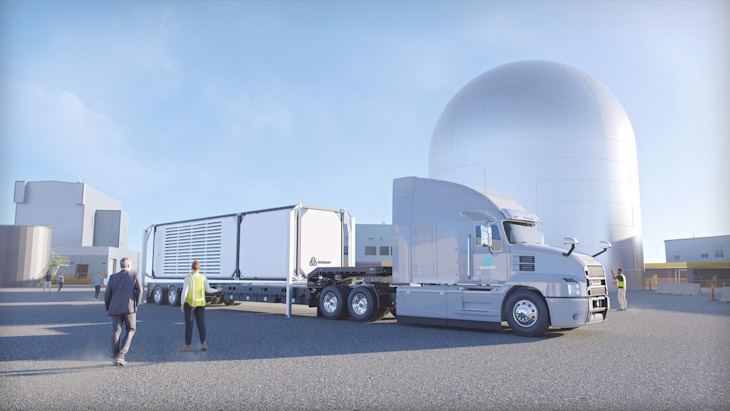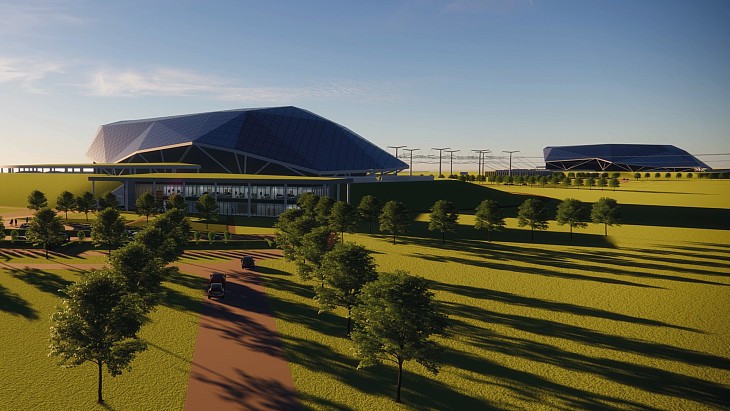The land for Radiant's new factory, which encompasses portions of the historic K-27 and K-29 Manhattan Project sites, has been purchased from the Oak Ridge Industrial Development Board. Originally constructed as part of the Manhattan Project - a research and development programme undertaken during World War II to produce the first nuclear weapons - Oak Ridge was home to some of the first nuclear facilities in the world.
With construction of the factory set to begin in early 2026, Radiant said this agreement keeps it on track to deliver its first mass-produced Kaleidos nuclear generator by 2028, and, within a few years, scale up production to 50 reactors per year.
"In recognition of this ambitious mission, and to honour the site's heritage, Radiant plans to name their new factory R-50," the company said.
Radiant is developing the 1 MWe Kaleidos high-temperature gas-cooled portable microreactor, which will use a graphite core and TRISO (tri-structural isotropic) fuel. The electric power generator, cooling system, reactor, and shielding are all packaged in a single shipping container, facilitating rapid deployment. The company plans to test its first reactor in 2026, with initial customer deployments beginning in 2028.

A rendering of the Kaleidos microreactor arriving at the DOME facility (Image: Ryan Seper/Radiant)
Radiant is the sixth company to locate in Tennessee utilising the Nuclear Energy Fund, the Tennessee Department of Economic and Community Development (TNECD) noted. The USD50 million fund was in Tennessee Governor Bill Lee's recommended 2023-2024 budget and approved by the Tennessee General Assembly. An additional USD10 million was allocated and approved in the state's budget during both the 2024 and 2025 legislative sessions, bringing the fund's total to USD70 million since its inception.
"What was formerly the first Manhattan Project site will now be the site of the first portable nuclear generator production," said Radiant founder and CEO Doug Bernauer. "By 2028, we'll be rolling out the first factory-built nuclear generator, and within a few years we'll be producing over a dozen per year."
Tori Shivanandan, Chief Operating Officer of Radiant, added: "We chose Oak Ridge, Tennessee, because of their strong workforce, the community's rich nuclear heritage and the public's second-to-none nuclear IQ. Just as importantly, the state's business-friendly environment gave us the immediate regulatory certainty we needed to move fast and be up and running to meet growing customer demand for our nuclear generators. We're excited to start building in just a few months."
"Tennessee is quickly emerging as the national leader in clean, reliable energy production," Governor Lee said. "That's why innovative companies like Radiant are choosing our state for cutting-edge manufacturing and R&D. I'm proud to welcome Radiant to the Tennessee family and look forward to the vital role this company will play on the global stage, producing what will become the world's first nuclear microreactor from right here in Oak Ridge."
"Radiant's USD280 million investment and creation of 175 high-quality new jobs is a critical win for our state's growing nuclear ecosystem," said TNECD Commissioner Stuart McWhorter. "This investment marks the third nuclear project we've announced since September, reinforcing the state's position at the forefront of next-generation energy innovation. We thank Radiant for its commitment to Tennessee and look forward to seeing the lasting impact this project will bring to our state and all Tennesseans."
In August this year, Radiant was one of 11 advanced reactor projects selected by the US Department of Energy (DOE) for the Nuclear Reactor Pilot Program, which aims to see at least three of them achieve criticality in less than one year. The pilot programme, announced in June, aims to expedite the testing of advanced reactor designs that will be authorised by the Department at sites located outside of the national laboratories. Part of the Reforming Nuclear Reactor Testing at the Department of Energy executive order signed by President Donald Trump in May, its goal is "to construct, operate, and achieve criticality of at least three test reactors using the DOE authorisation process by 4 July 2026."
In July, Radiant was one of the two companies selected by the DOE to perform the first tests in the National Reactor Innovation Center's Demonstration of Microreactor Experiments test bed at the Idaho National Laboratory.
Earlier this year, it was one of eight technology developers selected as potential microreactors suppliers made eligible to receive funding under the Advanced Nuclear Power for Installations programme: an initiative launched in 2024 by the Defense Innovation Unit in collaboration with the Department of the Army and the Department of the Air Force, with the goal of "working to design, license, build, and operate one or more microreactor nuclear power plants on military installations".

_82118.jpg)



_19544_40999.jpg)


_66668.jpg)





